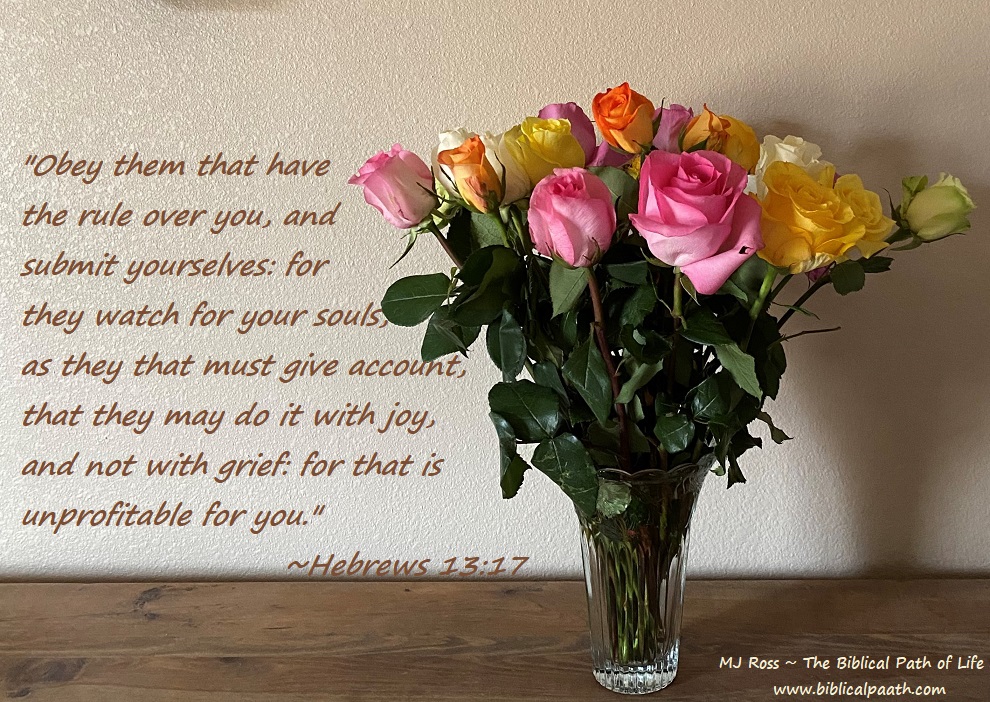
Key Verse
Obey them that have the rule over you, and submit yourselves: for they watch for your souls, as they that must give account, that they may do it with joy, and not with grief: for that is unprofitable for you.
—Hebrews 13:17
Key Verse Thought: Read the Key Verse. Think for a minute. Is it ever hard to obey someone who is in authority over you? Consider the authority in the written Word of God and those who teach the doctrines therein. Even when it may be difficult, we are called to not only obey, but also choose to do it correctly. Consider how you treat one who teaches you (and may occasionally correct or admonish you). Do not make their task more difficult, for they must give an accounting to God for how they teach you, and they want it to be a joyful time. If you respond incorrectly, you may just miss the blessing intended for your life.
Emphasis: We must first have a heart of flesh, so God’s Word can be written therein. Then we must be a watchman, telling all of the world about Jesus, so they can know God as the God.
Lesson Summary: Weeks of Bible study time could be spent just on the book of Ezekiel. However, because we are not doing an exhaustive study, but an overview, we will take two lessons to study highlights of the book of Ezekiel. Remember that Jeremiah witnessed the captivity of Judah by Babylon and the destruction of Jerusalem. The book of Lamentations, written by Jeremiah, is a poem revealing the horrors of seeing the city of Jerusalem and the temple of God destroyed after a terrible siege against the city. Jeremiah and Ezekiel both lived during the demise of Israel.
Ezekiel was carried captive from Jerusalem during the second invasion of Babylon by King Nebuchadnezzar. Once in Babylon, God came to Ezekiel in a heavenly vision and called him to be a watchman for God to the house of Israel. God gave Ezekiel the words that needed to be spoken to His people. The people of Judah had to understand that they were being disciplined for their sin. God often called Ezekiel “the son of man.”
After God showed Ezekiel the wickedness that had permeated God’s Temple, Ezekiel witnessed God’s Spirit depart from the Temple in Jerusalem, and finally from this earth.
God was chastising His people by using their enemy, Babylon. It was because of the many transgressions of God’s people. But most importantly, God wanted His people to know that He is the Lord (this is expressed around 70 times in Ezekiel). Ezekiel was to be sure to let God’s people know that He had not forsaken them, but that He had future plans for them.
As many other prophets before, Ezekiel was to call the people to repentance. There were many signs that God had Ezekiel use to gain the people’s attention, and to reinforce the message God had for His people. For lack of time, we will not look at these. (Some of the signs of Ezekiel: a tile, filthy food, a razor, a pot, a fire, lay on left/right, prepare his clothes to move, smite hands together, not to mourn his wife’s death, etc.)
It is in the book of Ezekiel where we also understand that God judges each individual. God does not save the child because of the father, or the father because of the child. Each person is accountable unto God for his or her actions in his or her own life – whether in righteousness or in iniquity. God wants each individual to turn from his or her sin, and only then will he or she live.
Y3Q4 – Lesson 1 Children’s Worksheets
If you are teaching this to younger children, the following is a craft idea to help them remember this lesson:

Leave a Reply